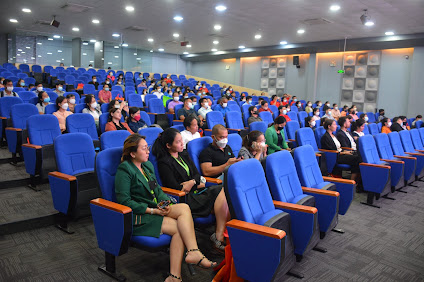EuroCham paper mirrors the demands made by GMAC over the past few years. It’s important to look at the issue of capacity charges and make the policy more favorable for solar installation. This would address international market demands for green production as well as most buyers’ policies and commitments to meet their renewable energy targets. Environmental protection has become a very serious issue now.

Say Samal, the environment minister, examines a collection of solar panels in Kampong Thom province in February 2021. Content image courtesy of Phnom Penh Post. MOE
The industrial sector is being urged by the European Chamber of Commerce in Cambodia (EuroCham) to adopt effective renewable energy (RE) policies, and the government is being urged to do away with capacity fees for solar energy and embrace renewable sources entirely.
The Royal Government of Cambodia [RGC], as stated in the Power Development Plan [PDP] 2040, has prioritized guaranteeing dependable, cheap, and improved energy security, according to EuroCham's "Position Paper on Renewable Energy in Cambodia," which was published on September 2.But it added that "[RE] is the most important factor for the continued, renewed, or initial investment into a market, followed by affordability and reliability, for international manufacturers and investors in higher quality production, those with high carbon neutrality targets, and those who consider investing into sustainable production in attractive markets."
The government-run utility Electricite du Cambodge (EdC) imposes a monthly "capacity charge" based on the demand contracted with customers that join at higher voltage levels, although this currently only applies to solar systems. This is something that Germany's GIZ has pointed out. All other technologies are subject to a straightforward, one-part per-kWh tariff.
"Capacity costs are too expensive," continues EuroCham. For bigger solar systems, the cost of solar electricity is approximately $0.07/kWh, but for smaller systems, the cost is $0.84/kWh. This contradicts the regulation's stated purpose and renders the investment unappealing and unprofitable from an economic standpoint.
"The installation of solar rooftops could encourage Cambodia to make the switch to clean energy and assist in supplying the country's rising demand."
"A full endorsement and support of rooftop solar by the Cambodian government would be a huge step towards modernizing Cambodia's manufacturing base, to green the country's image, and to become more competitive while better integrating itself into regional economies," said Tassilo Brinzer, chairman of EuroCham.
EuroCham continues, "Capacity costs are too high." The cost of solar electricity is roughly $0.07/kWh for larger solar systems, whereas it is $0.84/kWh for smaller systems. This goes against the declared goal of the rule and makes the investment unattractive and economically unprofitable.
The installation of solar rooftops "could inspire Cambodia to switch to renewable energy and help meet the country's expanding demand."
According to Tassilo Brinzer, chairman of EuroCham, "the Cambodian government's full endorsement and support of rooftop solar would be a huge step towards modernizing Cambodia's manufacturing base, to green the country's image, and to become more competitive while better integrating itself into regional economies.
In order to assist Cambodia compete with Vietnam, Thailand, and other nations, the document promotes the complete installation of solar infrastructure in industrial complexes and industries, coupled with greater investments in the region.
Enabling rooftop solar adoption might reduce carbon emissions, develop a "future-proof industrial sector in sustainable energy" led by solar technology, and free up money for the government to spend less on power-related expenses.
Although the Kingdom currently uses 51% renewable energy, this percentage is anticipated to fall to 35% by 2030 and then rise to 43% by 2040. Over the ensuing two decades, this would result in a decrease in RE consumption of 8.1% overall.
The majority of apparel companies are under pressure from clients to install solar, according to Rogier van Mansvelt, vice head of EuroCham's Green Business Committee. The payback time is now between four and eight years, but the current tariffs eliminate around 50% of the solar advantage. Additionally, the installation's 50% capacity is impeding the proportion of solar replacement. "Cambodia should establish favorable solar rooftop laws and rates if it wants to continue to be attractive to investors in the apparel industry," he said.
According to EuroCham, 10GW of solar energy and 1.5GW of wind power could potentially result in $6.8 billion in investments for Cambodia in terms of investments. This serves as an example of the potential of RE.
In more detail, a recent UNDP research on luring new FDI (foreign direct investment) found that … ‘Cambodia has the potential to attract significant private sector investment in solar PV, estimated at $903 million across the four solar PV sub-sectors to achieve the report’s targets’."
Source: Phnom Penh Post
































